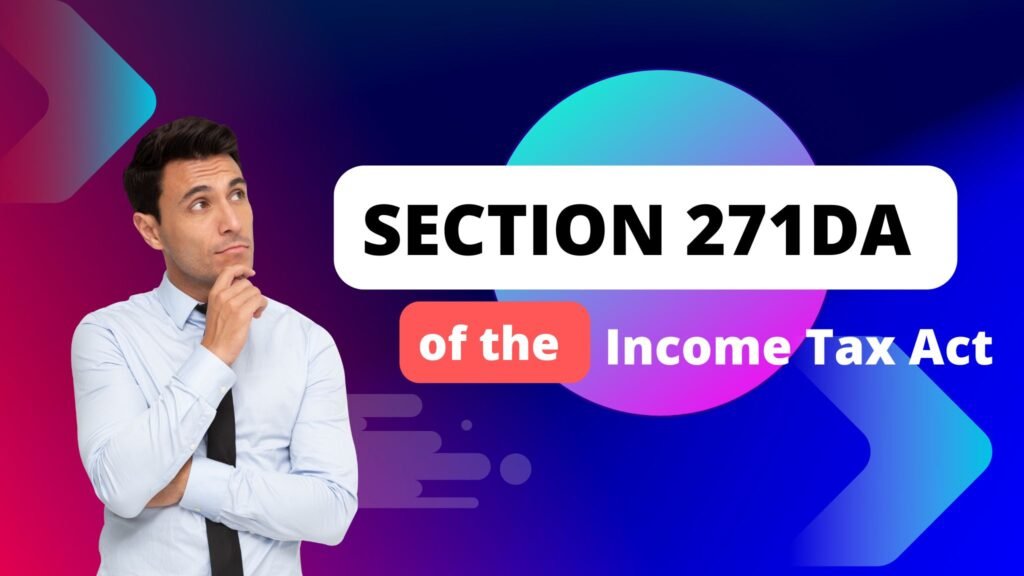The Income Tax Act in India is a set of laws that guide how taxes are collected and managed in the country. One important part of this law is Section 271DA of the Income Tax Act, which deals with cash transactions. This section is meant to stop people from using large amounts of cash in transactions, encouraging them to use digital or non-cash methods instead.
What is Section 271DA?
Section 271DA was created to limit how much cash can be used in certain transactions. According to this section, no one is allowed to accept cash of Rs. 2,00,000 or more in a single day. This rule applies whether it’s for one transaction or several transactions related to a single event or occasion.
The government introduced this section to fight tax evasion (when people avoid paying taxes by not reporting their full income) and to make financial transactions more transparent. By setting this cash limit, the government hopes to reduce the use of cash in large transactions and encourage people to use digital payments.
Who Does Section 271DA Apply To?
Section 271DA applies to everyone—individuals, businesses, and other entities. It’s important to know that the Rs. 2,00,000 limit is for the total amount of cash received in a single day, not just for one transaction. For example, if you receive Rs. 1,00,000 in cash in the morning and Rs. 1,50,000 in cash later that day for the same purpose, the total would be Rs. 2,50,000, and this section would apply.
Exceptions to Section 271DA
While this section is strict, there are some exceptions where the rule doesn’t apply:
- Government Transactions: Any cash transaction with the Central Government, State Governments, or local authorities is exempt from this rule.
- Banking Transactions: Transactions done through banks, post offices, or cooperative banks are not covered under this section.
- Other Exceptions: The government can also notify certain transactions or individuals that are exempt from this rule.
These exceptions are helpful in situations where cash transactions are necessary or legally required.
What Happens if You Don’t Follow Section 271DA?
If you accept Rs. 2,00,000 or more in cash, breaking the rule under Section 271DA, you will have to pay a penalty. The penalty is equal to the amount of cash you received. So, if you accept Rs. 2,50,000 in cash, you will have to pay a Rs. 2,50,000 penalty.
This penalty is enforced by the Joint Commissioner of Income Tax (JCIT), and there is no option to reduce or avoid it under the law. This makes it very important to follow this rule carefully to avoid paying large penalties.
Why is Section 271DA Important?
The government introduced Section 271DA for several reasons:
- Fighting Black Money: Large cash transactions often lead to the creation of black money (unreported income). By limiting cash transactions, this section helps reduce the generation of black money.
- Encouraging Digital Payments: The government wants to move towards a cashless economy. By limiting cash transactions, Section 271DA pushes people to use digital payment methods like bank transfers, UPI, and credit cards.
- Making Transactions Transparent: Cash transactions are hard to trace, which makes tax evasion easier. Section 271DA helps make transactions more transparent, making it easier for tax authorities to monitor and audit them.
- Improving Tax Compliance: The penalties under Section 271DA encourage people to follow tax rules more strictly, reducing the chances of tax evasion.
Section 271DA and Demonetization
When the government demonetized high-value currency notes in 2016, it aimed to reduce black money, fake currency, and corruption. Section 271DA is a part of this broader effort to discourage the use of cash, which often fuels black money.
How to Comply with Section 271DA
To avoid penalties under Section 271DA, here are some tips:
- Avoid Large Cash Transactions: Try not to accept cash amounts of Rs. 2,00,000 or more in a single day.
- Use Digital Payment Methods: Opt for bank transfers, credit/debit cards, or UPI for large transactions instead of cash.
- Keep Accurate Records: Maintain detailed records of all your transactions. This will help you prove that you are following the rules if the tax authorities ask.
- Seek Professional Advice: If you’re unsure about the rules, consult a tax professional or a chartered accountant. They can help you ensure that your transactions comply with Section 271DA.
Impact on Businesses
Section 271DA has significantly impacted businesses, especially those that used to rely heavily on cash transactions. Here’s how:
- More Transparency: Businesses that have switched to digital payments now have more accurate transaction records. This transparency helps them comply with tax laws more easily.
- Less Tax Evasion: Since digital payments are easier to track, Section 271DA has reduced the chances of businesses hiding income from the tax authorities.
- Building Trust: Businesses that follow Section 271DA and use digital payments are often seen as more trustworthy by customers and partners. This can lead to better business opportunities.
- Challenges: Switching from cash to digital payments has been challenging for some businesses, especially in rural areas where banking facilities are limited. However, these businesses are adapting by investing in technology and training.
Examples of How Section 271DA Works
Here are some simple examples to help you understand how Section 271DA applies:
- Selling Property: Suppose Mr. A sells his house to Mr. B for Rs. 10,00,000. Mr. B pays Rs. 8,00,000 via bank transfer and Rs. 2,00,000 in cash on the same day. Since the cash payment is exactly Rs. 2,00,000, it’s within the limit. But if Mr. B had paid Rs. 2,01,000 in cash, Mr. A would have to pay a Rs. 2,01,000 penalty.
- Business Sales: XYZ Ltd., a business, accepts Rs. 1,00,000 in cash from two different customers on the same day. Since these payments are from different customers and not related to the same event, Section 271DA does not apply.
- Loan Repayment: Ms. C accepts Rs. 2,50,000 in cash from a friend as repayment for a loan. Since the cash amount exceeds Rs. 2,00,000, Ms. C will have to pay a penalty of Rs. 2,50,000.
These examples show why it’s important to be careful with cash transactions to avoid penalties.
Challenges and Criticisms of Section 271DA
While Section 271DA is important for promoting digital payments and reducing tax evasion, it’s not without its challenges:
- Difficulties in Rural Areas: People in rural areas may find it hard to follow this rule because of limited access to banks and digital payment methods.
- Impact on Small Businesses: Small businesses that usually deal in cash might struggle to switch to digital payments, making it harder for them to comply with this rule.
- Complex Rules: The rules can be complicated, and not everyone is aware of them. More education and awareness are needed to help people understand and follow the law.
- Risk of Penalties: The penalties under Section 271DA are strict, which can be a heavy burden for those who unintentionally break the rules.
Conclusion
Section 271DA of the Income Tax Act is a crucial part of India’s effort to curb tax evasion and promote a cashless economy. It imposes penalties on large cash transactions, encouraging people and businesses to use digital payment methods. While it has its challenges, especially in rural areas and for small businesses, it plays an essential role in increasing transparency and reducing the circulation of black money in the economy. It’s important for everyone to understand this section, comply with its rules, and seek professional advice if needed to avoid penalties.
Also Read
- Section 271DA of the Income Tax ActThe Income Tax Act in India is a set of laws that guide how taxes are collected and managed in the country. One important part of this law is Section 271DA of the Income Tax Act, which deals with cash…
- 194E of Income Tax Act: A Comprehensive GuideThe Indian Income Tax Act, 1961, is a law that outlines how taxes should be handled in India. Within this law, there is Section 194E, which specifically deals with how taxes should be deducted on payments made to non-resident sportsmen…
- 194F of Income Tax Act: A Detailed OverviewThe Income Tax Act of 1961 is a comprehensive statute that governs the taxation of income in India. Within this act, various sections deal with specific aspects of taxation, including the obligations of taxpayers, tax rates, and deductions. Section 194F…
- Section 10 23C iiiad of Income Tax ActTax laws in India have special provisions that allow certain institutions to avoid paying taxes. Section 10 23C iiiad of the Income Tax Act is one such provision, specifically aimed at helping smaller educational institutions. It allows them to be…
- Section 10 23C iv of the Income Tax Act: A Detailed ExplanationSection 10 23C iv of the Income Tax Act, 1961, is a part of the Indian tax law that offers tax exemptions to certain organizations. This section is particularly important for institutions that work for the public good, such as…
Frequently Asked Questions
What is Section 271DA of the Income Tax Act?
Section 271DA of the Income Tax Act sets a limit on cash transactions. It prohibits accepting Rs. 2,00,000 or more in cash in a single day for a single transaction or related transactions. This section is designed to reduce the use of cash in large transactions, promote digital payments, and prevent tax evasion. If someone breaks this rule, they face a penalty equal to the amount of cash received. This section applies to everyone, including individuals and businesses.
Who does Section 271DA apply to?
Section 271DA applies to all individuals, businesses, and entities in India. The rule prohibits anyone from accepting cash amounts of Rs. 2,00,000 or more in a single day for a single transaction or related transactions. This limit applies whether the cash is received from one transaction or several that are connected. The purpose of this rule is to reduce the use of cash in large transactions and to encourage people to use digital payment methods instead.
Are there any exceptions to Section 271DA?
Yes, there are exceptions to Section 271DA. Transactions involving the Central Government, State Governments, or local authorities are exempt. Also, transactions conducted through banks, post offices, or cooperative banks are not covered under this rule. The government can also notify other specific transactions or entities that are exempt. These exceptions allow for flexibility in situations where cash transactions are necessary or legally required, ensuring that the law does not create undue hardship.
What penalty is imposed for violating Section 271DA?
If you violate Section 271DA by accepting Rs. 2,00,000 or more in cash, the penalty is equal to the amount of cash you received. For example, if you accept Rs. 3,00,000 in cash, you will have to pay a penalty of Rs. 3,00,000. This penalty is imposed by the Joint Commissioner of Income Tax, and there is no provision in the law to reduce or waive it. This makes it crucial to follow the rules to avoid such severe penalties.
Why was Section 271DA introduced in the Income Tax Act?
Section 271DA was introduced to reduce the use of cash in large transactions, prevent tax evasion, and promote transparency in financial dealings. By limiting cash transactions to Rs. 2,00,000 or less, the government aims to encourage the use of digital payments, which are easier to track and audit. This section is also part of broader efforts to curb the generation of black money in the economy, ensuring that financial transactions are recorded and reported accurately.
How does Section 271DA affect businesses in India?
Section 271DA has significantly impacted businesses, especially those that previously relied heavily on cash transactions. It has pushed many businesses to adopt digital payment methods, improving transparency and reducing the risk of tax evasion. While this shift has led to more accurate financial records and better tax compliance, it has also posed challenges for small businesses and those in rural areas where access to digital payment infrastructure is limited. Overall, the section encourages businesses to operate more transparently and compliantly.
Can I accept Rs. 2,00,000 or more in cash if it’s from different customers?
If you receive cash from different customers on the same day, and the transactions are not related to the same event or occasion, Section 271DA may not apply. However, if the transactions are connected or related to a single event, the cash received from all customers combined should not exceed Rs. 2,00,000. It’s important to carefully consider the nature of the transactions to determine whether this section applies, and to keep detailed records to avoid penalties.
How does Section 271DA help in fighting black money?
Section 271DA helps fight black money by limiting large cash transactions, which are often used to avoid paying taxes. By capping cash transactions at Rs. 2,00,000, the section encourages the use of digital payments, which are easier to track and audit. This reduces the chances of unreported income and makes it harder for individuals and businesses to hide their earnings. The increased transparency in financial transactions helps the government identify and address tax evasion more effectively.
How can I comply with Section 271DA to avoid penalties?
To comply with Section 271DA and avoid penalties, it’s essential to avoid accepting Rs. 2,00,000 or more in cash in a single day for a single transaction or related transactions. Instead, use digital payment methods like bank transfers, UPI, or credit/debit cards for large transactions. Additionally, maintain detailed records of all your transactions to ensure transparency. If you’re unsure about the rules, consult a tax professional or chartered accountant who can guide you on compliance and help you avoid hefty penalties.
What challenges do rural businesses face under Section 271DA?
Rural businesses often face challenges in complying with Section 271DA due to limited access to banking facilities and digital payment infrastructure. In many rural areas, cash transactions are still the norm, making it difficult for businesses to switch to digital payments. Additionally, there may be a lack of awareness about the rules and penalties under this section. These challenges make it essential for the government to improve digital payment infrastructure in rural areas and increase awareness about the importance of complying with tax laws.







